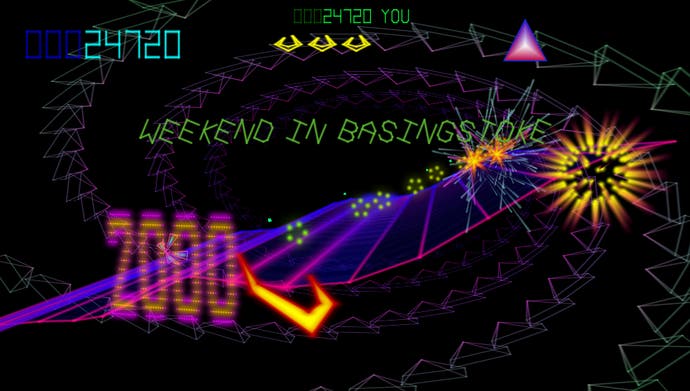Games of 2014: TxK
Remaster blaster.
Throughout 2014, the number of remasters often felt like it was going to topple the number of new games. It was likely always going to be the way as the new consoles found their feet - as publishers realised the huge investment required in building these ever more opulent worlds, and as it dawned upon them it's probably best they went and applied a bit of spit and polish to a select few of the older ones in order to have something to put on the shelves.
It helped, too, that both the PlayStation 4 and Xbox One lacked backwards compatibility - damming up one area to open a nice, easy revenue stream for Sony, Microsoft and various other publishers. It wasn't just a straight shot of cynicism, though - and some of 2014's best experiences were to be found in revisiting old favourites from new, technologically empowered places.
Grand Theft Auto 5, one of the greatest achievements in open-world design on the last generation of hardware, managed to be one of the finest looking games on the current generation thanks to its 1080p re-release, while The Last of Us Remastered offered a welcome chance to return to Naughty Dog's modern classic. Other remasters were just as welcome, even if they didn't have quite the same impact: Square's revival of Spira for Final Fantasy 10 and 10-2, for example, or its impressive re-spec of Crystal Dynamics' Tomb Raider.

There was one remaster that went above and beyond the big-budget spectaculars, though: a proper re-examination that offered more than graphical flourish, and that benefited from 20 years of wry study. When Jeff Minter and Llamasoft returned to Tempest for the fourth time with TxK, its design spoke of an obsessiveness and an attention to raw, exquisite detail that could only come through the slightly deranged intimacy the celebrated designer has with Dave Theurer's original 1981 template.
The Vita, Sony's handheld that defiantly hosted highlights of the year such as OlliOlli, Hohokum and Rogue Legacy in the face of its own commercial failure, certainly played a part in TxK's excellence. As was the case with 2014's other remasters, Llamasoft's return to Tempest made the most of the technology at hand - the analogue stick standing in for the original spinner control, the OLED screen allowing this portable Tempest to come closer to the original's searing vector display than has ever been possible before.
Llamasoft's revisits of old classics - the Robotron-inspired Llamatron, the Ikaruga-aping Super Ox Wars, and Caverns of Minos, a loving tribute to the 8-bit Caverns of Mars - do so much more than rehash what's gone before. They're overlaid with a psychedelic filter that's become something of a calling card for the developer, dancing particles and lurid colours adding a lysergic edge in this retooling of what was once a starker aesthetic.
There's real magic and wonder to these lightshows, too - I often think a Minter game, when at its brilliant best, would fit nicely amongst the work of the GPO's experimental film unit, the games' imaginative animations sitting alongside the wild dances of Norman McLaren and Len Lye. Other remasters might have been able to boast of more pixels and being able to attain 1080p, but what's been added in TxK - vibrant, bustling colour - is more vital, even if it's harder to affix a value to.
TxK is more than a new neon skin for an old favourite, though - it's a revival and restoration that runs deep throughout the 100 levels. In each one of them there's the mark of gentle obsession that really marks out so much of Llamasoft's work; play it and you're sharing in a passion that's infectious, being ushered through the chaos by an enthusiastic old friend.
This is a gentler game than what's gone before, at first anyway. The Reset Best feature that's carried on from Llamasoft's Minotaur Project games, in which each level acts as a checkpoint, logging your score and number of lives, that can be returned to, makes for a far more approachable experience, and one that's more willing to take you through all it has to offer.
It's the perfect entry point into Minter's work, if you haven't sampled it before, though that's not to say there isn't an edge - TxK is capable of spitting fury and fire your way while it spins you around in a tumble-dryer of phosphorous lines. There's nothing gentle about later levels, either, where the wireframe tunnel starts bucking and bending, a ketamine-dosed bullride that flips back on itself while tossing you about.
For how frenetic it gets, TxK is never aggressive: it's a friendly fire, backed up by a soundtrack that seems to have found its way from a well-loved Dreamscape cassette discarded in the footwell of a Vauxhall Nova. It's the perfect backdrop to TxK's quickfire hit of euphoria that it sustains throughout entire sessions; no other game in 2014 made me feel quite as happy as TxK did, and when you slip into its zone it renders your face an odd tangle of deep, intense concentration and a beaming, electric grin.
That's the beauty of TxK, really - how, within its abstraction, there's a little something that never ceases to make me smile, no matter how many times I go back to it. The kernel's the same as Theurer discovered over 30 years ago, of course, but in Minter's hands it's become more intoxicating than ever before. It's perhaps more relevant too, and if you're after a not-so-gentle reminder just how much fun video games can be, 2014 served up nothing finer than TxK.


